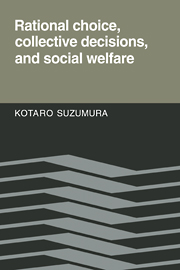Book contents
- Frontmatter
- Contents
- Preface
- Chapter 1 Prologue
- Chapter 2 Rational choice and revealed preference
- Chapter 3 Arrovian impossibility theorems
- Chapter 4 Simple majority rule and extensions
- Chapter 5 The fairness-as-no-envy approach in social choice theory
- Chapter 6 Impartiality and extended sympathy
- Chapter 7 Individual rights and libertarian claims
- Chapter 8 Epilogue
- Notes
- Bibliography
- Index
Chapter 6 - Impartiality and extended sympathy
Published online by Cambridge University Press: 07 October 2011
- Frontmatter
- Contents
- Preface
- Chapter 1 Prologue
- Chapter 2 Rational choice and revealed preference
- Chapter 3 Arrovian impossibility theorems
- Chapter 4 Simple majority rule and extensions
- Chapter 5 The fairness-as-no-envy approach in social choice theory
- Chapter 6 Impartiality and extended sympathy
- Chapter 7 Individual rights and libertarian claims
- Chapter 8 Epilogue
- Notes
- Bibliography
- Index
Summary
It is…certain that pity is a natural sentiment, which, by moderating in every individual the activity of self-love, contributes to the mutual preservation of the whole species. It is this pity which hurries us without reflection to the assistance of those we see in distress; it is this pity which, in a state of nature, takes the place of laws, manners, virtue, with this advantage, that no one is tempted to disobey her gentle voice:… it is this pity which, instead of that sublime maxim of rational justice, Do to others as you would have others do to you, inspires all men with that other maxim of natural goodness a great deal less perfect, but perhaps more useful, Do good to yourself with as little prejudice as you can to others.
Jean-Jacques RousseauIntroduction
According to Dahl (1956, p. 36), “no one has ever advocated, and no one except its enemies has ever defined democracy to mean, that a majority would or should do anything it felt an impulse to do. Every advocate of democracy of whom I am aware, and every friendly definition of it, includes the idea of restraints on majorities.” Therefore, it may well be claimed that a difficulty identified by Example 4.5, which comes to the fore only when we apply the simple majority decision rule mechanically, can hardly be attributable to this rule as its intrinsic defect.
- Type
- Chapter
- Information
- Rational Choice, Collective Decisions, and Social Welfare , pp. 153 - 179Publisher: Cambridge University PressPrint publication year: 1983



